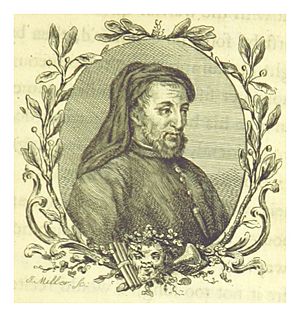Richard Edwardes facts for kids
Richard Edwardes (sometimes spelled Edwards) was a talented English poet, playwright, and composer. He was born on March 25, 1525, and passed away on October 31, 1566. He worked for the royal family as a Gentleman of the Chapel Royal and was in charge of the singing boys. He was especially known for writing funny plays called comedies and short performances called interludes.
His Life Story
Richard Edwardes was born in 1525 in a place called Somerset, England.
He started his studies at Corpus Christi College, Oxford in May 1540. Later, he joined Christ Church, Oxford when it first opened in 1546. He also joined Lincoln's Inn, which is a place for studying law, but he did not become a lawyer. By 1557, he joined the Chapel Royal, which was a group of musicians and singers who performed for the King or Queen. In 1561, he became the Master of the Children, meaning he was in charge of the young singing boys in the Chapel Royal. Richard Edwardes married Helene Griffith in 1563. After he died in 1566, another talented person named William Hunnis took over his role.
His Creative Works
Richard Edwardes was a very creative person. He wrote plays, poems, and even music!
Plays He Wrote
One of Edwardes' plays was called Palamon and Arcite. In 1566, this play was performed for Queen Elizabeth I at Oxford. An unexpected event happened during the show, but the performance still continued that night.
His most famous play that we can still read today is a comedy called Damon and Pithias. He wrote it in 1564, and it was published a few years later in 1571. It tells the story of two very loyal friends.
His Poems
Ten of Richard Edwardes' poems can be found in the first edition of a book called Paradise of Dainty Devices. The person who published the book, Henry Disle, said that most of the poems were written by "M. [Master] Edwards." It's possible that Edwardes even helped put together the original collection of writings that this book was based on.
His Music
While he was well-known for his plays and poems, Edwardes also composed music. Several of his musical pieces still exist today. For example, three of his pieces are in a collection called the Mulliner Book. These include "O the syllye man," and two other songs often thought to be his: "In goinge to my naked bedde" and "When grypinge griefes." He also wrote a song for his play Damon and Pithias called "Awake, ye woeful wights." Another piece is his musical setting of the Lord's Prayer, which appeared in Richard Day's Psalter in 1563.
 | Jessica Watkins |
 | Robert Henry Lawrence Jr. |
 | Mae Jemison |
 | Sian Proctor |
 | Guion Bluford |


